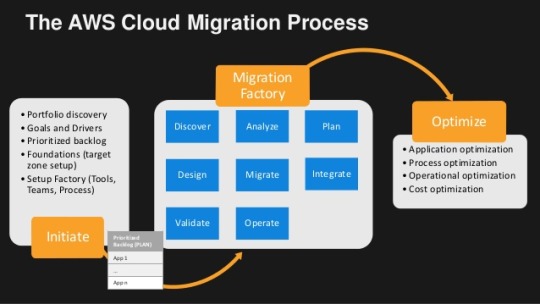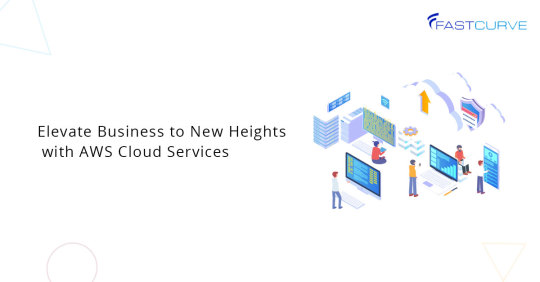#AWS Cloud migration services
Text
The impact of Amazon Bedrock on the future of business

As business technology evolves, Amazon Bedrock is reshaping the way organizations operate. In the future, artificial intelligence could transform not only businesses but entire industries. Embark on a journey exploring how Amazon Bedrock redefines strategies and innovations based on generative AI, where advanced AI tools redefine strategies.
What is Amazon Bedrock and why is it important?
Amazon Bedrock, a new offering from Amazon Web Services (AWS), is a crucial player in the generative AI arena. It provides businesses with advanced tools to harness the power of artificial intelligence, serving as the foundation for innovation. The AWS Cloud Consulting Services offered by Softweb Solutions will help you understand Amazon Bedrock and its potential.
Modern digital landscapes are complex, and businesses must embrace cutting-edge technologies to succeed. Amazon Bedrock offers a comprehensive suite of tools designed to empower organizations across various industries. From predictive analytics to personalized customer experiences, Amazon Bedrock features serve as a driving force for transformative change.
How could Amazon Bedrock impact the future of the business?
The implications of Amazon Bedrock reach far and wide, touching on various aspects of business operations. From streamlining processes to fostering innovation, businesses are set to benefit significantly. The integration of generative AI opens doors to unprecedented opportunities, empowering organizations to stay ahead in the ever-competitive market.
As businesses adopt Amazon Bedrock, they gain access to a wealth of data-driven insights. These insights not only enhance decision-making processes but also pave the way for the development of agile business strategies. The ability to analyze vast datasets in real-time provides a competitive edge, enabling companies to respond swiftly to market changes and consumer trends.
What should entrepreneurs and business owners do to prepare for the impact of Amazon Bedrock?
As Amazon Bedrock becomes a cornerstone of business strategies, entrepreneurs and business owners must proactively prepare for its impact. Embracing generative AI requires a strategic approach, including staff training, infrastructure adjustments, and a forward-thinking mindset. Stay ahead of the curve by exploring AWS Consulting Services for expert guidance on implementing Amazon Bedrock.
Preparation for the Amazon Bedrock era involves more than just technological integration. It demands a cultural shift within organizations—a commitment to fostering a culture of innovation and adaptability. Entrepreneurs and business owners should invest in ongoing training programs to ensure their teams are equipped with the skills needed to harness the full potential of Amazon Bedrock.
Impact on business models
The introduction of Amazon Bedrock is poised to redefine traditional business models. With AI-driven insights and predictive analytics, companies can optimize their operations, identify new revenue streams, and enhance overall efficiency. The adaptability of business models will be crucial to leveraging the full potential of Amazon Bedrock.
Business leaders should view this evolution as an opportunity to reevaluate and redesign their existing business models. Amazon Bedrock enables organizations to move from reactive decision-making to proactive strategy development. This shift not only enhances operational efficiency but also opens doors to innovative approaches to product development, marketing, and customer engagement.
Impact on the workforce
The workforce landscape is evolving, and Amazon Bedrock plays a pivotal role in this transformation. Automation of routine tasks allows employees to focus on strategic and creative endeavors, fostering a more dynamic and engaged workforce. However, ensuring a smooth transition requires thoughtful planning and upskilling initiatives.
Rather than viewing automation as a threat, businesses should position it as a catalyst for professional growth. Amazon Bedrock allows employees to redirect their efforts toward tasks that require critical thinking, creativity, and emotional intelligence – areas where human skills excel. Companies should invest in upskilling programs to equip their workforce for the evolving demands of the digital age.
Impact on customer expectations
Customers are becoming increasingly tech-savvy, and their expectations are evolving accordingly. With Amazon Bedrock, businesses can deliver personalized experiences, predictive services, and a level of efficiency that aligns with the demands of the modern consumer. Adapting to these changing expectations is key to staying competitive in the market.
The integration of Amazon Bedrock allows businesses to anticipate customer needs and preferences with unprecedented accuracy. This proactive approach to customer service not only enhances customer satisfaction but also builds brand loyalty. As businesses align their strategies with the capabilities of Amazon Bedrock, they position themselves as industry leaders in meeting and exceeding customer expectations.
Conclusion
In conclusion, as we navigate the digital frontier, Amazon Bedrock emerges not just as a technological advancement but as a catalyst for profound change. This paradigm shift demands proactive integration, a commitment to innovation, and strategic decisions. The era of generative AI is here, and those who seize the opportunities presented by Amazon Bedrock are not only positioned to survive but to thrive in an age of unparalleled digital innovation.
In the coming years, the transformative impact of Amazon Bedrock on the future of business will unfold. Those businesses that proactively integrate this revolutionary technology into their operations will not only survive but also thrive in an era of unprecedented digital innovation.
FAQ: Frequently asked questions
1. Q: What is Amazon Bedrock, and why is it significant for businesses?
A: Amazon Bedrock is a generative AI solution from AWS, revolutionizing how businesses operate. It offers advanced tools for harnessing the power of AI, providing transformative opportunities for innovation and efficiency.
2. Q: How can businesses prepare for the impact of Amazon Bedrock?
A: Business leaders should proactively prepare by investing in staff training, adapting infrastructure, and fostering a culture of innovation.
3. Q: What are the impacts of Amazon Bedrock on business models?
A: Amazon Bedrock redefines traditional business models by offering AI-driven insights and predictive analytics. This enables businesses to optimize operations, identify new revenue streams, and enhance overall efficiency.
4. Q: How does Amazon Bedrock affect the workforce?
A: Amazon Bedrock automates routine tasks, allowing employees to focus on strategic and creative endeavors. To ensure a smooth transition, businesses should invest in thoughtful planning and upskilling initiatives.
5. Q: How does Amazon Bedrock address changing customer expectations?
A: Amazon Bedrock allows businesses to deliver personalized experiences and predictive services, aligning with modern consumer demand. Adapting to these changing expectations is crucial to staying competitive.
#Amazon Bedrock#Amazon Bedrock features#AWS Consulting Services#aws cloud consulting services#aws cloud migration services
1 note
·
View note
Text
Sigma Solve offers AWS cloud migration services to efficiently transfer your on-premises applications to AWS platform that deliver outstanding performance and operational agility. We have expertise in offering AWS cloud solutions and providing end-to-end AWS migration services, ensuring a smooth transition and unlocking the benefits of scalability, performance, and cost efficiency.
0 notes
Text

In today's fast-paced digital landscape, cloud technology has emerged as a transformative force that empowers organizations to innovate, scale and adapt like never before. Learn more about our services, go through our blogs, study materials, case studies - https://bit.ly/463FjrO
#engineering#technology#software#softwaredevelopment#cloud#data#itservice#engineeringservices#Nitorinfotech#ascendion#softwareservices#itconsultancycompany#itcompany#cloud pillar#what is cloud data storage#aws cloud migration services#cloud engineering services#pillars of cloud#gcp cloud vision#google cloud#google cloud platform#google cloud console#cloud computing trends#cloud storage services#cloud storage
0 notes
Link
AWS Best Practices: Leveraging the Advantages of Amazon Web Services
Amazon Web Services (AWS) has emerged as a leading cloud computing platform, offering a wide range of services to individuals and businesses. To make the most of AWS, it’s crucial to follow best practices that ensure optimal performance, security, scalability, and cost efficiency. In this article, we will explore the key AWS best practices and the advantages they bring to organizations. By understanding and implementing these practices, businesses can maximize the benefits of AWS and unlock its full potential.
#aws#aws cloud consulting services#aws cloud computing#cloud computing#aws cloud migration services#web developers#web developing company#web development
0 notes
Text
Empowering Digital Transformation: Top Cloud Computing Companies in India
India’s digital landscape is witnessing a surge in cloud computing adoption, driving businesses towards scalable and efficient IT solutions. This article explores the leading cloud computing companies in India, playing a pivotal role in enabling organizations to embrace the power of the cloud. From providing robust infrastructure to offering cutting-edge services, these cloud service providers are revolutionizing the Indian business landscape.
1. Amazon Web Services (AWS):
As a global leader in cloud computing, Amazon Web Services (AWS) has a strong presence in India. With a robust infrastructure and a wide range of services, AWS empowers businesses with scalable and secure cloud solutions. From storage and computing capabilities to advanced analytics and artificial intelligence, AWS provides Indian businesses with the tools they need to innovate and grow.
2. Microsoft Azure:
Microsoft Azure offers a comprehensive suite of cloud services tailored to meet the unique needs of businesses in India. With a strong focus on hybrid cloud deployments and seamless integration with Microsoft products, Azure enables organizations to leverage the power of the cloud while maintaining flexibility and familiarity. Azure’s advanced capabilities, including AI, machine learning, and data analytics, empower businesses to unlock insights and drive innovation.
3. Google Cloud Platform (GCP):
Google Cloud Platform (GCP) brings the power of Google’s infrastructure and advanced technologies to businesses in India. GCP offers a broad range of services, including compute, storage, networking, and data analytics. With its focus on data security and AI capabilities, GCP enables organizations to derive valuable insights, enhance productivity, and accelerate their digital transformation journey.
4. Sify Technologies:
Sify Technologies stands as a prominent cloud service provider in India, empowering businesses with comprehensive cloud computing solutions. With their diverse range of services, including infrastructure, platform, and software solutions, Sify Technologies enables organizations to achieve scalability, agility, and cost optimization. Their customer-centric approach and end-to-end support make them a trusted partner for businesses embarking on their cloud transformation journey.
Cloud computing has become a game-changer for businesses in India, and the leading cloud companies are at the forefront of this transformation. From Sify Technologies’ end-to-end solutions to the global expertise of AWS, the hybrid capabilities of Microsoft Azure, and the innovation-driven approach of Google Cloud Platform, these cloud service providers are revolutionizing the Indian business landscape. By partnering with these companies, organizations in India can harness the power of the cloud to achieve scalability, agility, and cost optimization, driving their digital transformation and gaining a competitive edge in the rapidly evolving market.
#cloud service providers#cloud services#google cloud#azure cloud services#azure cloud migration#aws cloud services#aws cloud migration services
1 note
·
View note
Text
Best AWS Cloud Services Provider
The Amazon Web Services (AWS) cloud computing platform offers various cloud-based services to companies and organisations worldwide. AWS cloud services aim to lower infrastructure costs, improve operational effectiveness, and enable commercial expansion for organisations. If you want to avail these services, Fastcurve provides the same. Fastcurve, an AWS cloud services provider, has a range of storage services, including Simple Storage Service (S3), that allows customers to store and retrieve data anywhere in the world.
#AWS cloud services#AWS cloud consulting services#AWS largest cloud provider#AWS cloud migration services
0 notes
Photo

Amazon Cloud Computing, also known as Amazon Web Services (AWS), is a comprehensive suite of cloud computing services offered by Amazon. AWS provides on-demand access to scalable computing resources such as computing power, storage, databases, and other services to businesses and individuals.
0 notes
Text
How Media Sector benefits from cloud Technology?
Cloud emerges as a good to go option for every industry. This technology penetrates all the primary sectors and gets into the media and entertainment industry too. We can’t say that all the media companies have adopted cloud yet some companies have adopted it and stand straight as an exemplar to the fellow companies. There is a big shift in the way the companies deliver content to the users
Why does the media industry need cloud?
Media and entertainment industry is kept on evolving and transforming its dimension in a certain period of time. Once people only relied on theatres to watch movies, now OTT platforms enable users to watch any movies at any time.
For instance, consider Netflix, The well-known OTT platform. Just think about the number of movies, series and documentaries, Pity hard to count, isn’t it? But its users can access any format of video on any devices at any time. How come it is possible!
The cloud! Yes, Netflix adopts AWS cloud infrastructure to streamline its operation. OTT Sector is resource intensive and they can’t do more with on-data premises infrastructure.
When clouds are giving more, why do they limit themselves with the outdated server infrastructure.
Benefits of cloud computing for media companies
Faster time to market
Media firms can easily launch new services thanks to the Cloud, which has emerged as a key competitive advantage for competitors in the sector. By processing huge content files and formats in the Cloud, highly scalable and secure on-demand services speed up content production and shorten workflow intervals. Mediacorp, Singapore's largest media firm, recently underwent the digital transformation of its broadcast operations employing Cloud technologies to manage hundreds of video file workflows end-to-end, including ingest, transcoding, and delivery, across Cloud and on-premises systems. It allowed Mediacorp to deliver content across its 35 brands for TV, radio, and OTT systems while orchestrating workflows and offering a centralized view and control point.
Global distribution
Many sizable OTT platforms operate in the cloud and use content delivery networks to provide video to viewers (CDNs). Demand can be unexpected if you're working with multiple regions. However, you may grow delivery on the cloud without over-provisioning to meet shifting demand. Additionally, you may use it to stream live, broadcast-quality material and channels online (as several providers do for major sports.
Streamlined Content Delivery
Workflows that are cloud-based help speed up the supply chain. This is so that content can be accessed directly by software and users without a chain of distributors once it is in the cloud. In order to disseminate breaking news or a game-winning goal with all distribution channels in close to real time, this can be very helpful for news broadcasting and live sports. Even better, consider automating the procedure.
Broadcasting
Finally on the increase is cloud-based channel playout and linear channel originating. The ability to move live streams into, around, and out of the cloud has been made possible by protocols like RIST, SRT, and Zixi, together with ever increasing connectivity and bandwidth. Warning: connection is still a topic that needs to be addressed
Better Collaboration.
More collaborative workflows are made possible by the cloud, particularly in the creation of content. Software as a Service (SaaS) technologies for collaborative document editing, file storage, and resource planning have been effectively adopted by many producers. They don't need much training to start enjoying a great user experience.
Secured Remote work
It is commonly known that the cloud, in conjunction with expensive collaborative technologies, makes it possible to work remotely and on the go. Applications, data, and devices used by your employees will also be protected by strong cloud security solutions. Employees can safely access their tools and resources anytime they need to thanks to technologies like single sign-on and multi-factor authentication (MFA). from any location.
Cost Optimization
Media businesses and broadcasters have been forced during the past few decades to manage their production expenses and delivery of digital content within the same budget constraints, which is highly challenging in this period of expanding the economy. In addition, traditional approaches and antiquated technology are long past their prime, and cloud computing is the ideal replacement because it is both reliable and cost-effective.
Scalability
Cloud computing offers simply unequalled scalability. Cloud computing is available to assist any M&E organization that requires a significant number of processing and networking resources to manage workload fluctuations, which may include some shows or live events. The scalability of cloud computing is simply unparalleled when compared to other technologies, and it gives businesses the flexibility to instantly scale resources up or down as needed. Additionally, geographic restrictions are no longer an issue thanks to cloud computing.
The way to Cloud
The process of moving your data to the cloud is known as cloud migration. With proper cloud migration strategy, you can transfer all your data successfully to the cloud. Businesses should also be ready for the changes that the cloud brings in. Once you switch to the cloud, everything changes from business practices to relationships. You can manage everything under this one roof.
Many businesses still hesitate to move towards cloud thinking that it is a complex and tedious process. With Managed cloud service providers, you can shift your data and monitor the cloud infrastructure without any hurdles.
If you are running a media company then you can get AWS Media Services from managed cloud solutions providers. Assisting with AWS Data Migration Service Providers would be the right thing to get started with. At first, they analyze your business needs and requirements and craft a cloud migration strategy. Once your data has moved to cloud, they take complete responsibility and monitor the cloud infrastructure round the clock.
Conclusion
There is no shortage of stars in the media sector, hereafter there will be more clouds! Slowly and steadily the world has started to adopt cloud computing. By following the footprints of big players in the industry, many startups have realized the importance of cloud computing and are growing along with it. Many more technologies will come and go but clouds are destined to stay forever.
0 notes
Text
AWS Migration Services in India is the primary migration service recommended for lift-and-shift migrations to AWS. AWS Application Migration Service simplifies and expedites your migration to the cloud. It allows you to quickly realize the benefits of migrating applications to the cloud without changes and with minimal downtime. Oneworld Logix provides the best AWS Migration Services in India, Navi Mumbai, and nearby areas. Call us at 882 882 0887.

#AWS#AWS Migration Services#AWS Migration Services in India#migration service#lift-and-shift migrations#AWS cloud migration services#advanced cloud migrations#AWS Migration Services in Navi Mumbai#AWS Migration Services near me
0 notes
Text
A Single Package of Solutions for Your AWS Cloud Issues

TeleGlobal is a leading company that provides comprehensive solutions for AWS cloud issues and the best package for you will depend on your specific needs and challenges. With a team of highly skilled and certified AWS experts, TeleGlobal helps organizations of all sizes optimize their AWS infrastructure, resolve complex technical issues, and ensure the smooth and secure operation of their AWS environment.
However, here are some common solutions that are commonly bundled together to address AWS cloud issues:
AWS CloudFormation: This service allows you to model and set up your Amazon Web Services resources in a repeatable and predictable manner, making it easier to manage and scale your infrastructure.
AWS Systems Manager: This service provides a unified interface to manage your AWS resources, including instances, patch management, resource inventory, and configuration management.
AWS Config: This service provides a detailed view of the configuration of your AWS resources and helps you track changes to your infrastructure over time.
AWS CloudTrail: This service provides a record of all API calls made to your AWS accounts, including the identity of the API caller, the time of the API call, and the request parameters. This information can be used to troubleshoot issues, ensure compliance with company policies, and improve security.
AWS CloudWatch: This service provides monitoring and logging for your AWS resources and applications, including the ability to set up custom alarms, view detailed logs, and create custom metrics.
AWS Trusted Advisor: This service provides best practice recommendations for your AWS infrastructure and can help you optimize your resource utilization, reduce costs, and improve security.
AWS Elastic Beanstalk: This service makes it easy to deploy and run applications on AWS, taking care of provisioning the infrastructure, deploying your application, and monitoring its health.
By using these services together, you can more effectively manage, monitor, and optimize your AWS infrastructure and applications. It's important to note that these services are not the only solutions available, and you may also benefit from additional tools and services, depending on your specific needs and challenges.
#aws cloud migration services#cloud migration#aws services#aws cloud consulting services#aws consulting partner#aws cloud#aws experts
0 notes
Text
Which is AWS Certification is Good Togo
There are many different types of cloud training programs available, so it can be difficult to determine which one is right for you. However, by considering your career goals and the specific skills you need to learn, you can narrow down your options and choose a program that will help you achieve your objectives.
One popular option for cloud training is the AWS Certified Solutions Architect – Associate Level certification. This certification is designed for individuals who want to work in a solutions architect role, and it covers a variety of topics related to AWS, including networking, storage, security, and more. If you're interested in pursuing this certification, be sure to check out our AWS Certified Solutions Architect course.
Another popular cloud training program is the Microsoft Azure Fundamentals certification. This certification is designed for individuals who want to learn about Azure, Microsoft's cloud computing platform. The course covers a range of topics related to Azure, including compute, storage, networking, and security. If you're interested in pursuing this certification, be sure to check out our Microsoft Azure Fundamentals course.
No matter which cloud training program you choose, make sure it aligns with your career goals and provides the skills you need to succeed in
#cloud training program#Microsoft Azure Fundamentals course#AWS Certified Solutions Architect#storage#networking#aws cloud migration services#aws cloud#aws certificate training#aws services
0 notes
Text
#الحوسبه السحابية#حوسبة السحاب#cloud computing#تعريف الحوسبة السحابية#google cloud#aws cloud services#aws cloud migration services#aws cloud consulting services
1 note
·
View note
Photo

EXPERT AWS CONSULTING SERVICES HELPING ENTERPRISES TRANSFORM THEIR BUSINESSES UTILIZING THE POWER OF THE CLOUD.
Whether you are planning to migrate to the AWS cloud or already leveraging AWS cloud services in some form or shape, it’s imperative to partner with an expert AWS consultation services provider like Continuum Innovations to drive more value in the cloud.
1 note
·
View note
Text
SAP on Cloud: Unleashing the Power of Scalability, Flexibility, and Cost-Efficiency
Cloud computing has revolutionized the way businesses operate, allowing them to access a range of IT resources and services without the need for on-premises infrastructure. One of the most promising applications of cloud computing is the deployment of enterprise resource planning (ERP) systems on cloud platforms. SAP, the market leader in ERP systems, has been at the forefront of this trend by offering SAP on cloud solutions to its customers. In this article, we will explore the benefits of deploying SAP on cloud and the role of cloud service providers in enabling this transformation.
What is SAP on Cloud?
SAP on cloud refers to the deployment of SAP applications on cloud platforms, such as Amazon Web Services (AWS), Microsoft Azure, or Google Cloud Platform. This model allows businesses to access SAP applications over the internet, without having to invest in their own hardware or software infrastructure. SAP on cloud provides the same functionality and features as on-premises deployments but with the added benefits of scalability, flexibility, and cost-efficiency.
Benefits of SAP on Cloud
There are several benefits of deploying SAP on cloud, including:
Scalability: Cloud platforms provide businesses with the ability to scale their SAP applications up or down based on their changing needs. This means that businesses can easily add new users, modules, or features without having to invest in new hardware or software infrastructure.
Flexibility: Cloud platforms offer businesses the flexibility to choose the deployment model that best suits their needs, whether it be public, private, or hybrid cloud. This means that businesses can deploy SAP on cloud solutions that meet their specific requirements and compliance needs.
Cost-efficiency: Deploying SAP on cloud can be more cost-efficient than traditional on-premises deployments. This is because businesses only pay for the resources and services that they use, without having to invest in hardware, software licenses, or maintenance.
Disaster Recovery: Cloud platforms provide businesses with disaster recovery capabilities that are not feasible with on-premises deployments. This means that businesses can quickly recover from unexpected downtime or data loss events.
Role of Cloud Service Providers
Cloud service providers play a critical role in enabling the deployment of SAP on cloud solutions. They provide the necessary infrastructure, security, and management services that businesses need to deploy SAP applications on cloud platforms. Cloud service providers also offer a range of tools and services that help businesses optimize their SAP on cloud deployments, including automation, monitoring, and analytics.
There are several cloud service providers that offer SAP on cloud solutions, including AWS, Azure, and Google Cloud Platform. Each provider offers unique features and capabilities that businesses can leverage to optimize their SAP deployments.
Conclusion
SAP on cloud is the future of business, offering businesses the scalability, flexibility, and cost-efficiency they need to compete in today’s fast-paced business environment. Cloud service providers play a critical role in enabling this transformation, providing businesses with the necessary infrastructure, security, and management services to deploy SAP applications on cloud platforms. As more businesses adopt SAP on cloud solutions, the role of cloud service providers will become increasingly important in enabling this transformation.
#sap services#cloud computing#cloud services#cloud service providers#cloud migration#aws cloud migration services
1 note
·
View note
Text

Fastcurve's cloud computing platform brings out the best you could get in the market. Our solutions incorporate world-class expertise, the latest technology to improve mobility, and efficient resource utilization in reduced delivery time. Simple Storage Service (S3), one of the storage services provided by Fastcurve, an AWS cloud services provider, enables users to store and access data from any location. Contact AWS cloud computing company, Fastcurve for more information.
0 notes